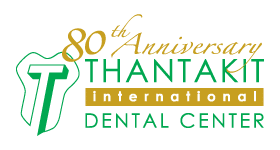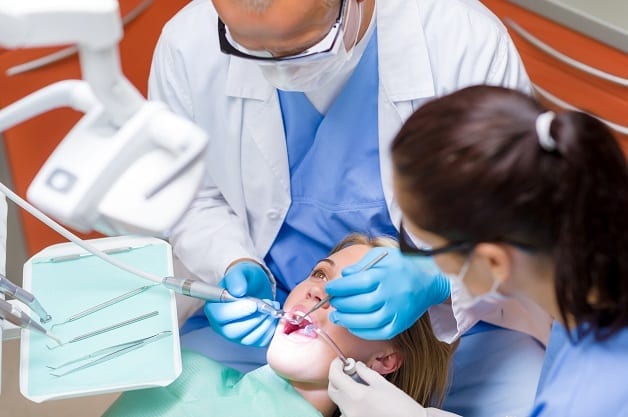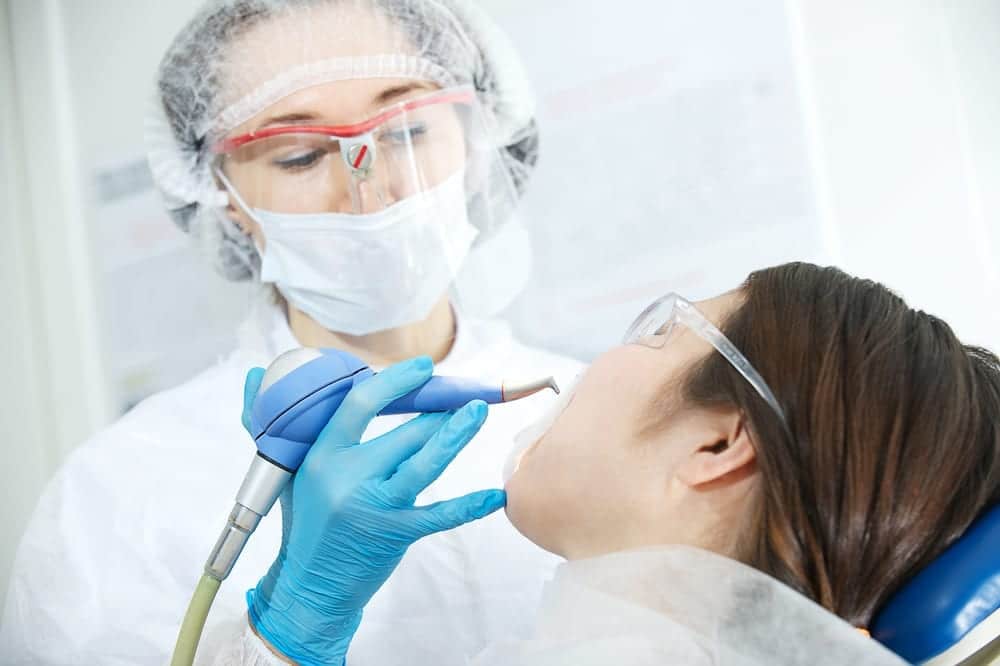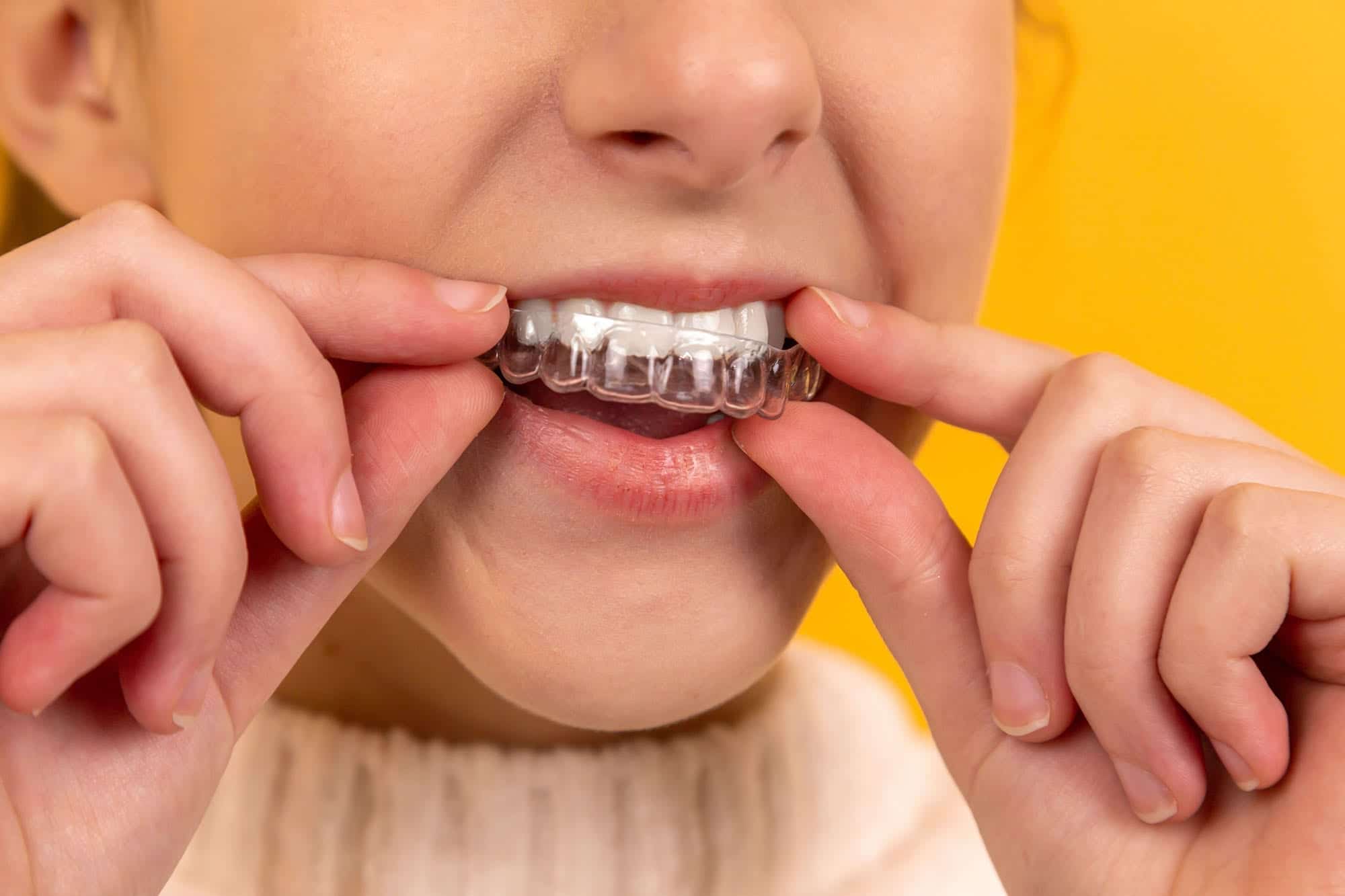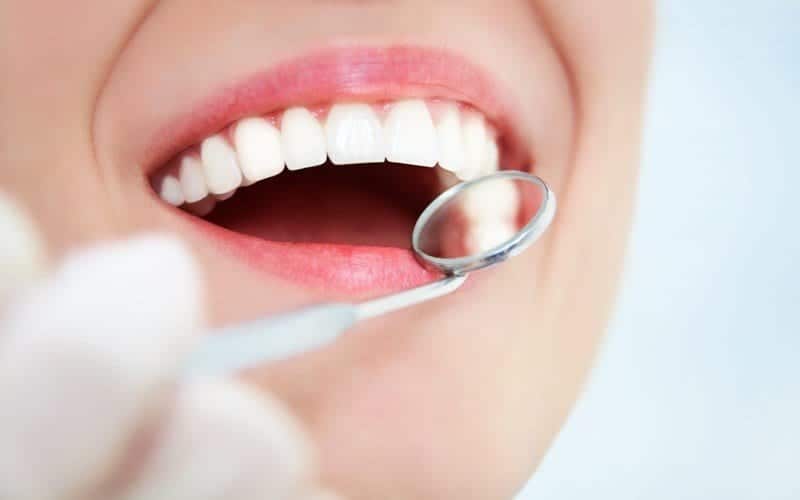An easy way to make secure good oral health is through your diet. Proper nutrition means your body can get the nutrients you need for good health and wellness. Poor diet can cause gum disease and tooth decay. If you continue to eat foods that are high in carbohydrates, sugars, and starches, your mouth’s production of plaque acids will increase and can eventually destroy your tooth enamel. If the plaque acids are not prevented from destroying the tooth enamel, the result is dreaded cavity.
Food that Causes Tooth Decay and Erosion
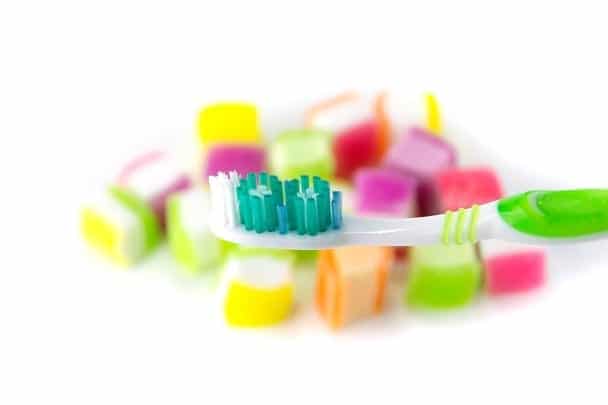
All sugars – sucrose, fructose, glucose, and so on – can cause tooth decay. Check the labels of foods and drinks to know if an item contains sugars, and how much it does.
Food and drinks that contain acids can erode the tooth enamel. For easy reference, below is the list of pH values of some foods and drinks. Note that values lower than 5.5 may cause erosion:
- Mineral water pH 7.6
- Milk pH 6.9
- Cheddar cheese pH 5.9
- Lager pH 4.4
- Orange juice pH 3.8
- Grapefruit pH 3.3
- Pickles pH 3.2
- Cola pH 2.5
- Vinegar pH 2.0
You will see that lager, orange juice, grapefruit, pickles, cola, and vinegar are highly acidic.
It is best for your oral health and general health to eat three (3) meals a day and avoid eating snacks. Snacks typically increase your sugar intake without you noticing it. To help reduce tooth decay, cut down on snacks, particularly if they’re of the sweet or acidic type.
While fruits are nutritious, they contain acids, so it’s advisable to eat small amounts and to brush and rinse your mouth after eating them. You may also opt to eat alkaline foods like cheese, raw vegetables, nuts, and breadsticks.
Water and milk are still the best choices for drinks. Juice should be taken during mealtime as it contains many acids. Keep in mind that fizzy drinks, such as sodas, can increase the risk of dental problems.
The Need for Nutrients
- You need protein for tooth structure, mucosal/connective tissue development, and immune function.
- Calcium and vitamin D are needed for good tooth structure and to enhance enamel re-mineralization.
- Phosphorus helps maintain good tooth structure.
- Iron, zinc, and vitamin A and C promote mucosal or connective tissues as well as strong immune function.
- Low levels of folate are associated with periodontal disease. Folate also helps in mucosal/connective tissues and immune function.
- Omega-3 fats modulate the inflammatory response.
- B vitamins are needed for epithelial cell turnover.
The Bad Guys
- Sticky candies and sweets can contribute to the formation of plaques.
- Starchy foods can get stuck in your mouth, which can leave food particles between your teeth that form plaques.
- Carbonated soft drinks also have sugar. These also have phosphoric and citric acids that erode the tooth enamel.
- Substances that dry out your mouth like alcohol and medicines are known to be detrimental to oral health.
The Good Guys
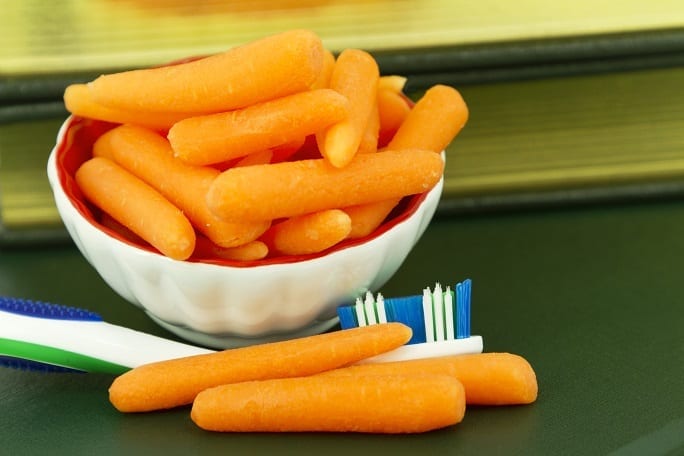
Here are some of the foods that will promote good dental health.
- Onion neutralizes oral bacteria. It has microbial properties that target bacteria that cause gum disease and cavities. Mix more onions to your meals.
- Green leafy vegetables like spinach holds vitamin C, which increases the production of red blood cells as it reduces inflammation. The mentioned benefits prevent gum diseases. Eating leafy greens require more chewing, which yields more saliva that fights bacteria in your mouth and contains proteins and minerals that protect your enamel. Include salads in your diet.
- Green tea has an antioxidant called catechins. Catechins prevent gum inflammation help gums fight inflammation. Try to drink a cup of green tea every day.
- Peppers and citrus fruits are also known anti-inflammatory agents. Eat fresh fruits like orange, pineapple, and strawberries.
- Shiitake mushrooms contain antibacterial compound called lentinan, which fights bacteria that forms dental plaques. Add shiitake mushroom as a side dish to your main course.
- Eat crunchy vegetables and fruits like celery, carrots, and apples. These foods do not get stuck in between your teeth but help in getting rid of food particles instead and generate saliva. A student of dentistry at Terna College said that apple is a natural toothbrush. It helps stimulate gums and prevents cavity buildup. Eat apple every dinner daily.
- Dairy products contain high calcium that helps in strengthening your bone and promotes healthy gums. Casein is a protein found in most dairy products which serves as a to neutralizer of oral acids produced by bacteria. These acids can be destructive to tooth enamel and gum tissue, leading to irritation or worse. Drink milk often. Include in your diet foods rich in vitamin D like egg yolks, salmon, and sardines. Vitamin D fights against tooth cavities and decay.
- Coconut can remove oral toxins. It has antifungal and antiviral properties, which can repair tooth decay and stop bad breath. Coconut oil pulling can kill harmful oral bacteria, reduce bad breath, prevent cavities, reduce gum inflammation, improve gum health, and naturally whiten your teeth. How to do coconut oil pulling? It is easy and involves only four (4) steps:
- Measure one (1) tablespoon of coconut oil.
- Swish the oil around your mouth for 15 to 20 minutes.
- Spit the oil.
- Rinse your mouth well.
- Water is the best beverage to maintain oral health as it dilutes oral acids from the bacteria. It helps rinse food particles from the teeth. It is best to drink water with fluoride or simply tap water to help strengthen your teeth. Drink as much water as you can – before and after you eat meals and even snacks.
- Cocoa is filled with substance that reduces gum inflammation and prevents erosion and decay.
- Kiwi prevents gum infection and helps in healing periodontal disease.
- Sugar-free gums prevent tooth decay so it is advisable to have sugar-free gums after meal. It also helps your jaw to exercise.
- Sesame seeds are rich in calcium, which keeps the teeth healthy and strong.
- Pears produce additional saliva that helps in fighting bacteria inside your mouth.
- Whole grains help in the absorption of calcium from the blood to your bones
- Avocado is great for dental health diet.
- Garlic is known to be good for the body and teeth. Garlic, like onion, contains antibacterial properties. It has a component called allicin, which makes it a potent antifungal, antiviral, and antibacterial. Allicin controls bad bacteria to cause cavities and gum disease. Make more delicious and mouth-friendly meals by adding garlic.
- Keep your teeth strong and healthy by eating foods rich in calcium and phosphorus. Best sources of calcium are yogurt, cheese (hard, aged), seafood, milk (low-fat), tofu, and almonds while phosphorus is pumpkin seeds, fish, red meat, and eggs.
- Anthocyanins, arginine, and polyphenols are beneficial to your oral health. Anthocyanins help prevent the attachment of plaque on the teeth and fights oral cancer. Berries, grapes, cherries, plums, and eggplant are the best sources of anthocyanins. Arginine is an amino acid that disrupts the formation of plaques and chances of cavities. It can be found in meat, soy, and nuts. Polyphenols slows the growth of bacteria preventing bad breath, gum disease, and cavities. Take black and green tea and cocoa for the benefits of polyphenols.
Habits for Good Oral Health
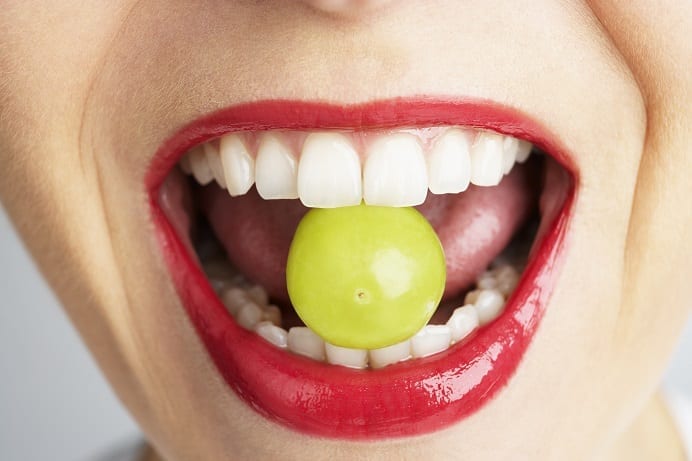
- Do not go to bed without brushing your teeth, as this will give bacteria ample time to spread throughout your mouth overnight. Continuous skipping of brushing teeth at night is known to lead to tooth decay.
- Brush your teeth properly. Brush at least two (2) minutes doing strokes that will brush all areas inside your mouth. Do the circular motion of brushing to remove plaques. When plaques are not removed, it will become tooth decay leading to gingivitis.
- Include your tongue in brushing. Plaque is possible to build up on you tongue. Skipping your tongue can lead to bad breath and other oral health problems. Brush your tongue gently to avoid irritation.
- Use fluoride toothpaste as fluoride defends your teeth from tooth decay and serves as a protective barrier for your teeth.
- Do not skip dental flossing. Treat it as important as brushing your teeth. Flossing reduces plaque formation and prevents gum inflammation.
- Use mouthwash as it reduces acids in the mouth, cleans hard-to-brush areas in and around the gums, and re-mineralizes your teeth.
- Drink a lot of water. Water is good to all parts of our body. Drink water after every meal to wash out toxins and acids.
- Eat crunchy fruits and vegetables as they help in cleaning clogged food particles in between your teeth.
- Limit sugary (sweets, chocolates, cakes, biscuits, etc.) and acidic foods as they can cause tooth decay and gum inflammation. Cut down sugar by reducing sugar in drinks and food, checking the labels on the back of the product packaging (high: more than 22.5g of total sugar per 100g; low: 5g or less of total sugars per 100g), check the ingredients list. Always remember that a healthy diet is good for your teeth.
- See your dentist at least twice a year to track your oral health regularly.
Dental and Nutritional Needs
- Pregnancy – the focus is on dental hygiene. Avoid sugary cravings to prevent gingivitis.
- 0-1 year of age – primarily met by breast milk and / or infant formula. Breastfeeding is encouraged as one of its general health benefits is to protect the infant from tooth decay. When your baby is taking infant formula, do not prolong the use of baby bottle during day or night. Avoid pacifiers from being dipped into sweets. These will cause rampant decay. On the sixth month, the infant can start eating baby foods, many of which promote tooth decay. Remember to limit your baby’s sugar intake. It is important to keep your baby’s gums clean to avoid the teeth from being erupted. Observe the infant’s feeding nutrition guidelines to ensure optimal nutrition.
- 1-2 years of age – discourage the child from carrying and continuously drinking from a bottle. It is also recommended to limit juice or sugar-containing drinks intake. Reduce the between-meal snacking of the child.
- 2-5 years of age – give your child nutritious, low risk foods (for dental decay) for meals and snacks. As much as possible, do not allow the child yet to eat sugar-rich food. Encourage the child to consume food at regular meal times.
Nutrition and Oral Health Key Points
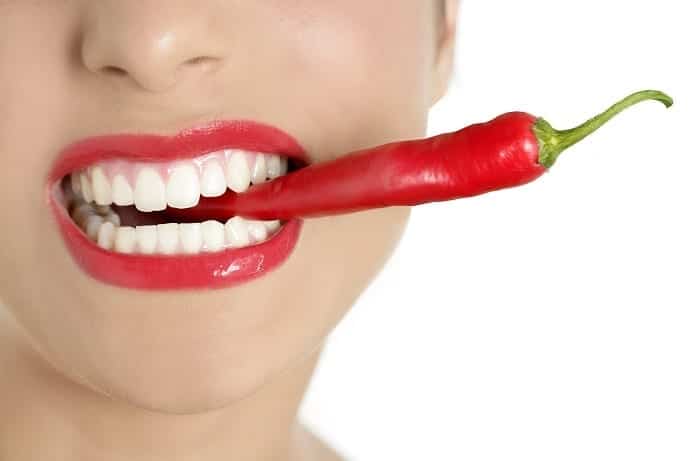
Keep in mind these key points about the best foods for dental health:
- Frequent consumption of sugar containing foods and drinks is the primary source of tooth decays.
- According to the Dental Health Foundation of Ireland, 23 percent of 8-year-olds and 40 percent of 15-year-olds consume sugary snacks or drinks between normal meals, 48 percent of adults snack between meals, most commonly biscuits and cakes. Eighty-six (86) percent of adults consume at least three (3) servings a day of foods high in sugar and fats.
- Poor nutrition and oral health shared common risk factor for other systemic parts of the body – cardiovascular diseases, obesity, etc.
- Oral health should be promoted as part of the overall health of a person.
It is important to have a well-balanced diet. Practice the think before you eat and drink. Imagine how the food and drink that you just had taken will affect your gums and teeth. It is better to eat a balanced diet and limit between-meal snacks. Studying about oral and dental health will help you internalize the dos and don’ts in achieving good oral health. It is also recommended to understand your oral health and have it checked regularly as it may entail your overall health status. Poor oral health is significantly associated with major chronic diseases. If you are in doubt or not comfortable with your oral health, do not hesitate to contact your dentist or any dental center nearest to you. Their goal is to maintain your oral and overall health in good condition and for you to live a positive and healthy life.
Besides having a good diet, regular consultations with a trusted dentist are crucial to maintain good oral and general health. Trust the dental experts at Thantakit International Dental Center, Thailand’s longest established dental center. Situated in Bangkok, our clinic is renowned across the world as a destination for world-class dentistry, with most of our patients flying to us from Australia.
Please contact us today and get a FREE dental consultation.
